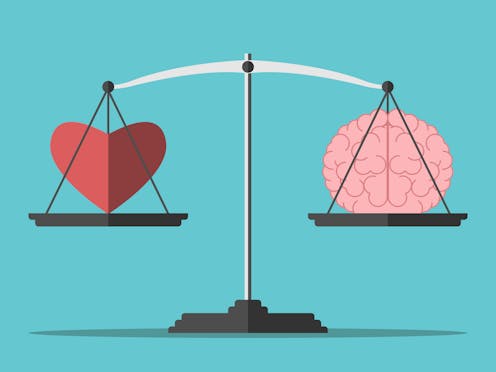Understanding emotions is nearly as important as IQ for students' academic success
- Written by Carolyn MacCann, Associate Professor, University of Sydney

The ability to understand emotions contributes almost as much to students’ grades as their IQ.
Past studies show two personal qualities are important for student academic success – intelligence and conscientiousness.
IQ scores explain about 15% of the differences between students’ grades. Conscientiousness, such as having the diligence to do enough study, explains about 5%.
Our recent research has found emotional intelligence explains 4% of differences between students’ achievement. But the ability to understand emotions, a component of emotional intelligence, explains about 12% of differences in students’ grades.
What is emotional intelligence?
Different researchers use slightly different definitions of emotional intelligence.
Some define emotional intelligence as the ability to perceive, use, understand and manage your own and other people’s emotions. This is called “ability emotional intelligence”.
Others also include character traits such as optimism, impulse control and the ability to motivate yourself. This is called “mixed emotional intelligence” because it is a mix of abilities and character traits.
We examined the findings of more than 150 studies on the link between emotional intelligence and academic performance. These studies included more than 42,000 students and 1,246 different estimations of the size of the relationship between emotional intelligence and academic performance.
Read more: Children benefit when taught social and emotional skills – but some methods are better than others
Some of the studies in our analysis used rating scales to assess emotional intelligence. Here, test-takers might rate their emotional abilities with items like “I am aware of the non-verbal messages other people send” or rate their mixed emotional intelligence with items like “I am motivated to succeed”.
Others tested emotional intelligence directly by measuring participants’ emotional abilities with skill-based tasks. For example, test takers might be asked to identify which emotion is expressed in a face.
We found that, overall, emotional intelligence explained about 4% of differences in students’ academic achievement. But some emotional intelligence types were more important than others.
Skill-based emotional intelligence, such as reading people’s faces, explained 6% of differences in academic achievement, but self-ratings of emotional abilities explained 1% of differences. So, emotional skills assessed from the outside are more important for students’ academic performance than students’ self-ratings (or self-beliefs) about their emotional skills.
 Students who understand emotions also know how to regulate their emotions in a stressful situation. Shutterstock
Students who understand emotions also know how to regulate their emotions in a stressful situation. Shutterstock
But some emotional skills were more important than others. The two most important emotional skills for academic success were understanding emotions and managing emotions.
Students who can understand emotions can accurately label their own and others’ emotions. They know what causes emotions, how emotions change and how they combine. Students who can manage emotions know how to regulate their emotions in a stressful situation. They also know what to do to maintain good social relationships with others.
Emotion management skills accounted for 7% of differences in academic performance . Emotion understanding skills accounted for 12%. That is, understanding emotions is more important for student success than conscientiousness (5%) and almost as important as students’ IQ (15%).
Read more: Understanding others' feelings: what is empathy and why do we need it?
Emotionally intelligent students tend to be more intelligent as well as more conscientious. But our study found it wasn’t just that emotionally intelligent students were also more likely to be intelligent and conscientious.
We applied a statistical technique called meta-regression to examine what the effect of emotional intelligence would be if everyone had the same level of conscientiousness and intelligence.
For students who had the same levels of conscientiousness and intelligence, emotional intelligence was still linked with higher academic performance.
For students with the same levels of intelligence and conscientiousness:
-
self-ratings of mixed emotional intelligence (the one involving both skills and character traits) explained 2.3% of differences in performance
-
emotion understanding skills explained 3.9% of differences in performance
-
emotion management skills explained 3.6% of differences in performance.
Why is emotional intelligence linked to good grades?
There are at least three reasons why we believe emotional intelligence relates to higher academic performance.
First, students with higher emotional intelligence can regulate their “academic emotions”. Students may feel anxious about tests and performance. They may feel bored when learning required but dull material. And they may feel frustrated or disappointed when they try their hardest but still can’t quite get the hang of a task.
Students who can regulate these tough emotions will achieve more. Anxiety will not impair the test performance. They can push through the boredom and frustration to master dull or difficult material. They can learn from negative feedback or failure rather than be derailed by disappointment.
Read more: Here's what teachers look for when kids start school
Second, students with higher emotional intelligence can form better social relationships with their classmates and teachers. They can get help with schoolwork or with social and emotional needs when they need it.
Third, many non-technical academic subjects require an understanding of human emotions and social relations as an inherent part of the subject matter. Analysing universal themes of love and betrayal in Shakespeare plays requires not just verbal skills but emotional knowledge and skill. Analysing the role of charismatic leaders in the rise of fascist regimes likewise requires social knowledge and analysis.
Our results show that teachers, parents and students should focus on student’s emotional skills not just for student’s well-being, but for their ability to succeed academically.
Authors: Carolyn MacCann, Associate Professor, University of Sydney





